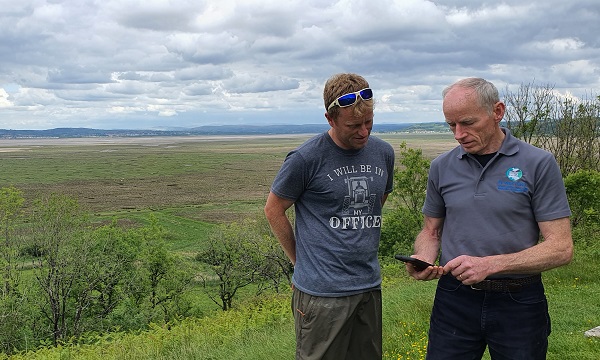Trials of a Biosecurity App have helped farmers and vets in Wales work together to tighten farm biosecurity and help reduce the need for antibiotics.
Featuring seven strategically located vet practices and 20 farms, the Biosecurity App trials have been effective in reducing the risk of infectious disease spreading from farm to farm. The result is healthier and more productive livestock and a reduction in the need to use antibiotics.
The trials are part of the award-winning Arwain DGC (Defnydd Gwrthficrobaidd Cyfrifol / Responsible Antimicrobial Use) programme to help vets, farmers and horse owners to address the spread of antimicrobial resistance (AMR) by reducing the need to use antibiotics.
The app’s trials have been organised by Arwain DGC veterinary delivery partner* Iechyd Da.

Working with the farmers for nine to 12 months, vets carried out a simple risk-based analysis of each farm and produced a personalised biosecurity ‘score’. The farmer then worked with their vet as a trusted advisor to make improvements.
The easy-to-use Biosecurity App helped identify areas for improvement on the farm and enabled the farm’s vet to give practical advice on making three priority improvements.. Any changes made were reviewed with the farmer during a follow-up visit after around three months and concluded with a final review and assessment visit after a further six to nine months.
Over 60% of recommendations to cattle or sheep farmers have already been – or are being implemented – which means every participating farm improved its biosecurity status during the project.
Of the 60 recommendations, the majority (27) related to stock movements: quarantine and isolation and review of the health status of introduced or returning stock. Some recommendations were linked to direct contact via boundaries and straying stock, and others regarded indirect contact. Further recommendations were made about visitors to the farm (including vets and contractors) or visits to marts and other livestock units.
Sheep farmer Dan Pritchard, who farms at Weobley Castle Farm in Llanrhidian, was among the first to take part in the app trial and subsequently made some changes to his farm’s biosecurity measures.
He said,
“The app definitely helped, as we could sit down and talk through the questions and then format a plan to make the changes. I could see the vet’s viewpoint better and gained a better understanding of the reasoning for making the changes, and by working together, we could see the overall picture.
“Also, having a score made it easier to understand and set a goal for what can be done to improve biosecurity. Even those small changes have further reduced our antibiotic use.”
Fellow Gower sheep farmer Simon Bevan, who farms at Scurlage, said,
“I think it is a good process, and although we were already pretty clued up on biosecurity, the App helped highlight a couple of things we could improve on.”
He added that with farm assurance scheme audits and retailers requiring tighter protocols and monitoring antibiotic use, the Biosecurity App would help farmers keep on top of requirements.
Ifan Lloyd, one of the vets involved in developing the tool, said,
“We’ve completed the piloting of the general biosecurity risk assessment app.
“We had designed a series of questions that would enable the farmer and vet to make an objective assessment by applying a score to each of the risks. We are extremely pleased by the level of engagement of the participating veterinary surgeons and their farmer clients.
“We were particularly impressed by the high standard of the written reports sent to the farmers. This is likely one of the reasons that so many of the recommendations were implemented.
“All the vets have been surveyed for their feedback following the completion of the project. Vets found it easy to use and intuitive and would be prepared to use this approach for biosecurity assessment in future.
“The questions helped to focus minds whilst the risk scores helped to measure the risk and to quantify any improvement made, making it a more objective, outcome-focused approach.”











